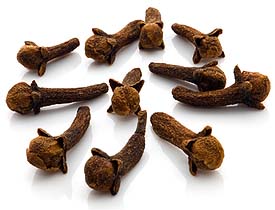| Home A B C D E F G H I J K L M N O P Q R S T U V W X Y Z |
|
Home |
Cloves: Health Benefits, Uses and Recipes
Cloves, which symbolize dignity, are the unopened flower buds of a tropical tree in the same family as allspice and guavas. The tree is native to the Molucca Islands (also known as the Spice Islands) in the Indian Ocean, but are now cultivated throughout Indonesia, Sri Lanka, Madagascar, Tanzania and Brazil. The word "clove" derives from the Latin word clavus, meaning nail, and refers to the tack-like shape of the dried bud. Cloves first arrived in Europe around the 4th century, but the spice remained a rare luxury until about 1500 when increased sea trade with the orient brought cloves in quantity into European kitchens. 
In Moluccan folklore, villagers treated blossoming clove trees like a pregnant woman. No man could approach them wearing a hat, no noise could be made near them and no light or fire could be carried past them at night for fear they would not bear fruit. Some Moluccans still plant a clove tree at the birth of a child, with the belief that if the tree flourishes, so will the child. Chinese medicine has used cloves to treat indigestion, diarrhea, hernia, ringworm and athlete’s foot and other fungal infections. In traditional Indian Ayurvedic medicine, the spice is used to treat respiratory and digestive problems. The brilliant medieval German abbess, composer and herbalist, Hildegard of Bingen recommended cloves in the treatment of gout. Toothache is still effectively treated with cloves as the eugenol in the spice has both analgesic and antiseptic qualities. A bruised clove or some clove oil on cotton wool is held in the mouth near the tooth. Some dentists still use cloves to disinfect ailing root canals and mix clove oil with zinc oxide for temporary fillings. In the kitchen cloves make a powerful contribution to both sweet and savory dishes. Generally whole cloves are removed from the dish before serving. To avoid discoloration of the dish, clear clove oil may be substituted for powdered cloves. As a testimony to the power of the scent of cloves, the clove-studded pomander is a perennial favorite as a room or closet freshener and moth repellent. Cloves have an affinity for green beans, pea soup, root vegetables, fruit compotes and salads, spiced teas, mulled beverages and pickles of all types. People on a bland diet should avoid cloves as the spice can be irritating to the intestinal tract. However, ground cloves, made without the clove head, are milder than the whole spice. Here’s a wonderful cold summer soup using cloves and cardamom: Summer Root Vegetable Soup 2 Tbsp. virgin olive oil Heat the oil in a large, heavy pot. Sauté the shallots and the hot pepper for several minutes, then add the carrots and turnips. Continue cooking for about five minutes before stirring in the spices, chicken stock and rice. Bring to a boil, then lower heat, cover and simmer for 25 minutes. Allow the soup to cool before blending it in batches until smooth. Add the milk and chill thoroughly. Garnish with a little fresh parsley. Here’s a great lemon and ginger pickle to serve with a curry or other spicy dish (it’s also great on cheese sandwiches!): Spiced Honey Lemon & Ginger Pickles 10 medium lemons, washed, dried and cut into quarter inch slices without peeling (discard as many seeds as possible as these will make the syrup bitter) 1 cup plus 1 Tbsp. honey Combine the honey, vinegar and salt in a non-reactive (e.g. glass, porcelain or stainless steel) saucepan. Tie the spices in a cheesecloth bag and add to the pan. Boil for five minutes. Add the lemons and ginger and bring back to the boil for another minute, stirring constantly with a wooden spoon. Discard the spices, pack the lemons into hot, sterilized half-pint jars, cover with the syrup and seal at once. Another excellent preserve recipe using cloves is the following one for spiced gooseberries courtesy of Gingerich Farms in Canby, Oregon. The recipe can be used as a jam or syrup or as an accompaniment to a meat dish. Spiced Gooseberries 2 quarts of gooseberries Wash the berries, remove the stems and blossom ends. Place sugar, vinegar and spices together in a large pot, add half a cup of water and boil for five minutes. Add the gooseberries and simmer for 30 to 40 minutes. When the berries are tender and the syrup is thick, strain out the spices and turn into hot sterile jars and seal. Bruce Burnett is an award-winning writer, a chartered herbalist and author of HerbWise: growing cooking wellbeing. Bruce and his wife Delaine own Olivia’s Fashion, Furnishings & Gifts http://www.olivias.ca/ Read more published articles by Bruce Burnett on his websites: http://www.bruceburnett.ca/ and http://www.herbalcuisine.com/ |
||
|
|
||
|
Glossary References Links Contact
|